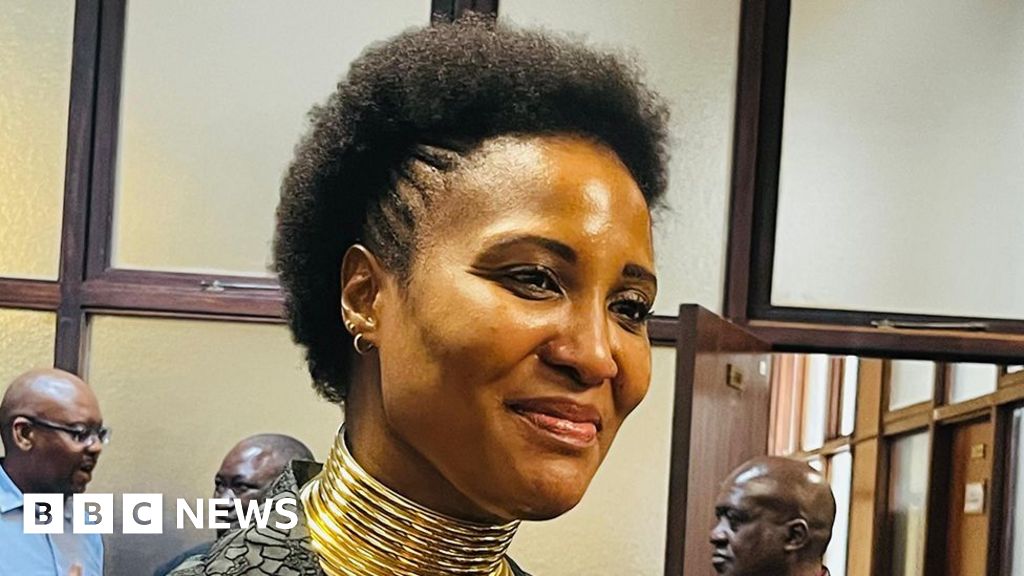The ex-president's daughter who faces terror-related charges

Duduzile Zuma-Sambudla, Daughter of Former South African President, Faces Terrorism Charges
Johannesburg - Duduzile Zuma-Sambudla, the daughter of former South African President Jacob Zuma, is set to stand trial this week on terrorism-related charges, marking a significant and unprecedented legal challenge in the country. The case revolves around social media posts she allegedly made during widespread protests and unrest in 2021, following her father's imprisonment.
The charges against Zuma-Sambudla include incitement to commit terrorism and incitement to commit public violence under the Protection of Constitutional Democracy against Terrorist and Related Activities Act. Prosecutors argue that her online activity fueled the deadly riots that engulfed KwaZulu-Natal and Gauteng provinces, resulting in over 300 deaths and billions of dollars in damages.
The 2021 Unrest: A Nation Gripped by Violence
The unrest in July 2021 was triggered by Jacob Zuma's incarceration for contempt of court after he failed to appear before a commission investigating corruption allegations during his presidency. The protests quickly spiraled into widespread looting, arson, and violence, exposing deep-seated social and economic inequalities within South Africa.
Zuma-Sambudla's social media activity during this period is now under intense scrutiny. The prosecution alleges that her posts, which included images of looting and messages of support for the protesters, incited her followers to continue the violence. One particular tweet featuring a burning vehicle transporter with the hashtag #FreeJacobZuma and the Zulu word "Amandla" is central to the state's case.
A Politically Charged Trial
The trial is highly politicized, given Jacob Zuma's recent shift to the uMkhonto weSizwe (MK) party, a rival to the ruling African National Congress (ANC). Zuma-Sambudla herself is now a member of parliament for the MK party. Critics argue that the case is politically motivated and aimed at undermining the former president's influence.
Willem Els, from the Institute for Security Studies, told the BBC that Zuma-Sambudla's higher public profile makes the case against her "very highly politicised with a strong public interest". He also questioned the timing of the charges, which were brought nearly four years after the unrest.
Expert Analysis: A Matter of Intent and Causation
Political science academic Prof Bheki Mngomezulu believes the case is politically motivated and a "way of fighting her father". "If she wasn't the daughter of the former president, chances are these charges would have been dropped a long time ago," he argued.
Els further emphasized the challenges facing the prosecution. "Prosecutors need to prove intent and causation that a post directly incited terrorism," he said. "There are few successful prosecutions under the relevant legislation, and it is the first time in South Africa's legal history that someone has been charged specifically with incitement of terrorism via social media."
The State's Case and the Defense's Strategy
The state's legal team faces the daunting task of proving beyond a reasonable doubt that Zuma-Sambudla's social media posts directly incited the violence and met the high evidentiary bar required for a terrorism conviction. The defense is expected to argue that her posts were merely expressions of support for her father and did not constitute a direct call to violence.
Zuma-Sambudla's lawyer has described the state's case as "weak," and she has used pre-trial hearings to publicly ridicule the accusations against her. She notably wore a shirt emblazoned with the words "Modern Day Terrorist" to one hearing, a move seen as a deliberate attempt to undermine the prosecution's case.
Historical Context: Zuma's Legacy and the ANC's Challenges
The trial unfolds against a backdrop of political turmoil and social unrest in South Africa. Jacob Zuma's presidency was marred by allegations of corruption and state capture, leading to his ouster in 2018. The ANC, once a powerful liberation movement, has faced declining popularity amid widespread dissatisfaction with the country's economic challenges and governance issues.
Implications for South Africa
The outcome of the trial could have significant implications for South Africa's political landscape. A conviction could further damage the Zuma family's reputation and weaken the MK party's influence. An acquittal, on the other hand, could embolden Zuma's supporters and fuel accusations of political persecution.
Regardless of the verdict, the trial is likely to generate intense public interest and further polarize South African society. The case also raises important questions about the role of social media in inciting violence and the limits of freedom of expression in a democratic society.
The Long Road Ahead
As the trial commences, South Africa awaits with bated breath. The legal proceedings are expected to be lengthy and complex, with both the prosecution and the defense prepared to present their cases vigorously. The outcome will undoubtedly shape the narrative surrounding the Zuma family and the ongoing challenges facing South Africa's democracy.
Originally sourced from: BBC News Africa
